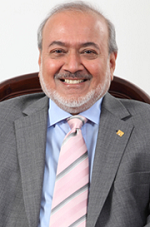 |
| Wockhardt Chairman Habil Khorakiwala |
Wockhardt Chairman Habil Khorakiwala says his company is shooting for next year to get the two plants banned by the FDA back in the mix of selling into the U.S. generics market. But first it must finish remediation plans, which now include recalling all Wockhardt drugs that were shipped to the U.S. before the FDA banned the two plants. It turns out that is a lot.
In the FDA's most recent Enforcement Report posted on Monday, it laid out 35 recalls of about 20 drugs that added up to more than 7.2 million bottles, cartons, pouches and drums, many in 500- and 1,000-count bottles, amounting to hundreds of millions of tablets and capsules. This is on top of the hundreds of thousands of units it has recalled since April, when it declared to the Bombay Stock Exchange its intention to recall the preban production from the plants in Waluj and Chikalthana. Of course it is unknown how many of the meds might still remain.
The products being retrieved range from a generic of the sleep aid Ambien and the antibiotic azithromycin to blood pressure meds amlodipine besylate and lisinopril and antiseizure drug phenytoin sodium, many in different dosages. The drugmaker has said it believes the drugs pose no threat to consumers.
While the recalls are said to be because Wockhardt had not adequately investigated consumer complaints, the FDA uncovered a lot more problems at the plants that led to the agency putting them on its import alert list in 2013. The plants were said to be testing "trial samples" of some drugs, then linking results from those to official samples that had not met test requirements. Computerized testing equipment was not password-protected to help prevent employees from deleting data.
Khorakiwala has said that the company is progressing in its remediations and that it has gotten positive feedback in a number of areas like securing computer systems used for testing products. He has told them Wockhardt hopes to satisfy FDA concerns and have the plants returned to U.S. production in 2016.
But that may be a tall order. India's Ranbaxy Laboratories has four plants sidelined by the FDA for sales in the U.S., two of which were put on the undeliverables list 7 years ago. Dilip Shanghvi, whose Sun Pharmaceutical bought Ranbaxy this year, has pledged to restore regulators' confidence in the facilities but also acknowledged it may take a while and will squeeze Sun's profits in the process. Sources have suggested it might not even try to get one of the four plants returned to service in the U.S. and direct its production, instead, toward other markets.
Wockhardt's need to get the plants back in action is underlined by what the FDA bans have done to the company's finances. The U.S. was the company's most profitable market and accounted for nearly half of its revenues before the FDA took its measures after documenting questions about drug testing and sanitation issues at the facilities. By fiscal 2015, which closed out March 31, that was down to 27% and only 21% for the final quarter.
- access the recalls here